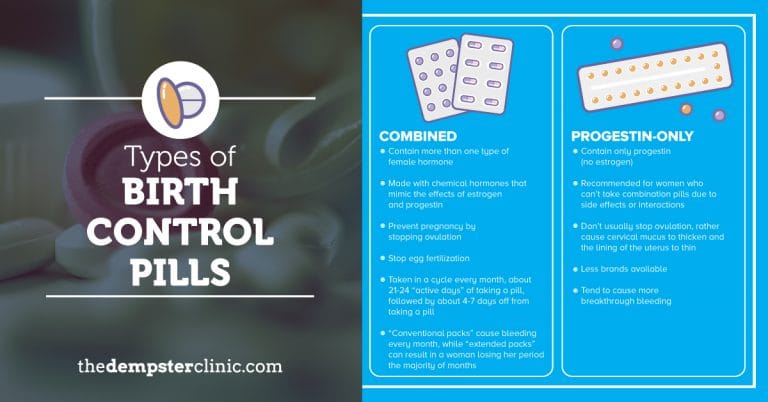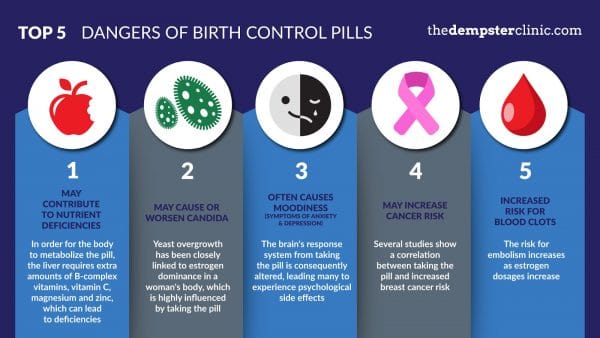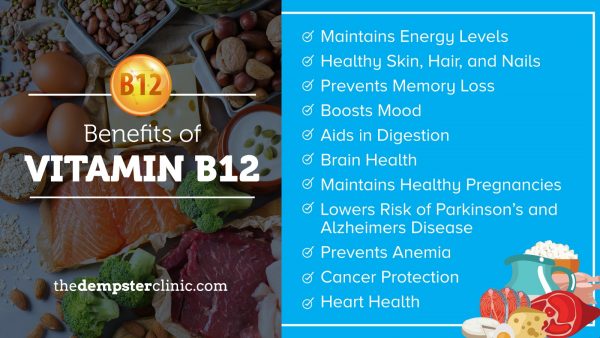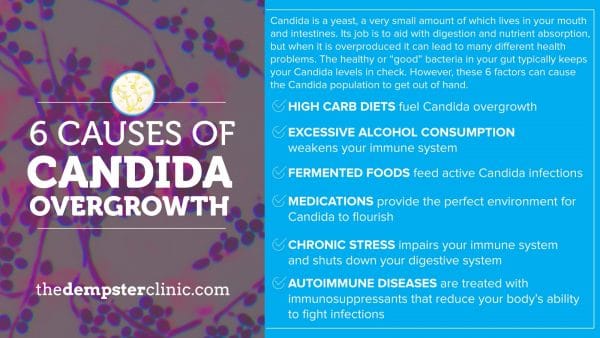Do you feel tired, moody, anxious, or like you’re “PMS-ing” all the time? If you recently started taking hormonal birth control pills, they could be the culprit. In addition to harmful mental side effects, oral contraceptives may also cause physical symptoms like breast tenderness, bloating, fatigue, and nausea. Birth control pills also create long-term risks; they may make you more susceptible to developing blood clots or breast cancer.
The ravaging side effects of birth control pills are often overlooked, or even dismissed, by health care professionals. However, they are real for many women. Continue reading to learn the basic science behind birth control pills, how their chemical makeup can wreak havoc on your physical and mental health, and what you can do about it.
BUT FIRST, THE BASICS: THE TWO TYPES OF BIRTH CONTROL PILLS

Before delving into the potential side effects of birth control pills, it is important to have a basic understanding of estrogen and progestin, the hormones used in birth control pills. Hormones are chemicals that your body naturally produces to send messages to its various systems. Estrogen and progestin are sex hormones produced in the ovaries, and they help regulate the menstrual cycle.
- Estrogen, which may be listed as “estradiol” on your pill package, is the dominant hormone in menstruating women. The ovaries produce estrogen, but it is also produced in the body’s fat tissue.
- Progestin is another female sex hormone that helps regulate menstrual cycles and pregnancy.
Birth control pills prevent pregnancy by impeding a woman’s natural menstrual cycle. Typically, birth control pills prevent ovulation, as well as thicken the cervical mucus. This makes it more difficult for sperm to enter the cervix and fertilize an egg. Additionally, birth control pills change the lining of the uterine cervix (womb). This means that even if an egg does become fertilized, it is less likely to successfully implant in the womb.
There are two kinds of birth control pills: Combination and Progestin-Only.
Combination birth control pills contain synthetic forms of estrogen and progestin. They prevent ovulation and stop egg fertilization. Typically, combination birth control pills come in a pack with 24 “active pills” followed by four to seven days of not taking the pill. (Or taking a sugar pill). Often, bleeding occurs during this four to seven day period.

- Progestin-only birth control pills, or “mini pills” do not contain any estrogen. These are often used as alternatives for women who are sensitive to the estrogen in combination birth control pills. The progestin thickens the cervical mucus and makes the lining of the uterus less hospitable to fertilized eggs, but it does not stop ovulation. The downsides to progestin-only birth control pills include less brand options and an increased likelihood of breakthrough bleeding.
THE TOP 5 DANGERS OF BIRTH CONTROL PILLS

1. They May Contribute to Nutritional Deficiencies
In order for your body to metabolize birth control pills, the liver requires extra amounts of B-complex vitamins, vitamin C, magnesium, and zinc. This can lead to nutritional deficiencies, unless you compensate by incorporating more of these nutrients into your diet. In order to understand the ramifications of these nutritional deficiencies, let us look at each one in more detail.
Vitamin C:
Vitamin C is an antioxidant that protects your body, skin, and hair from free radical damage. People lacking adequate levels of Vitamin C may experience weakened immune systems, anemia, hair loss, and dry or damaged skin. Other side effects include tiredness and symptoms of depression.

Magnesium:
Magnesium is an important mineral that helps many systems in your body function correctly. Deficiency in magnesium may increase your risk of osteoporosis, can make you feel fatigued or weak, and may cause high blood pressure. Additionally, a lack of magnesium can lead to mental health problems like anxiety, depression, and even emotional numbness.
B-Complex Vitamins:
Vitamin B12 is an essential nutrient for energy, regulating brain function, manufacturing DNA, producing red blood cells, and preventing anemia. A deficiency in this type of vitamin can lead to megaloblastic anemia, chronic fatigue, and mood changes. In fact, one alarming study found evidence that someone with a deficiency in Vitamin B12 may have double the risk of developing severe depression as compared with an individual with adequate levels of Vitamin B12.
Has your brain been feeling “fuzzy” since you began taking the pill? You aren’t crazy for feeling this way; people lacking in Vitamin B12 often experience poor concentration and memory problems.

Zinc:
You may be surprised to learn that zinc is required for over 2000 biochemical reactions! This essential mineral is necessary for the creation of new, healthy cells, which is why zinc deficiency is a serious issue. When your body is unable to generate new cells, you may suffer from a decreased ability to concentrate, an impaired sense of taste and smell, and a weakened immune system.
If you think you might be deficient in zinc, you may want to consider a simple at home Zinc Tally Test.
2. The Pill Has Been Shown to Cause or Worsen Candida Overgrowth
If you have ever suffered the side effects of a yeast, or candida infection, you know how uncomfortable and even painful they can be. Candida naturally occurs in the gut microbiome, but too much is definitely a bad thing. Yeast overgrowth has been closely linked to estrogen dominance in a woman’s body, which is highly influenced by taking a combination birth control pill. A study conducted by the University of Michigan shows evidence that women who use birth control pills have twice the risk of developing yeast infections!

3. Oral Contraceptives Worsen or Create New Symptoms of Anxiety and Depression
Negative emotional side effects, like depression and anxiety, are the most common side effects that are severe enough to cause women to discontinue the pill.
Synthetic progestin and estrogen have been shown to cause depression or worsen pre-existing depression. This is because progestin destabilizes mood-regulating chemicals like serotonin and monoamine oxidase. In addition to depression, side effects can manifest in the form of new or increased anxiety, irritability, and mood swings.

To illustrate, consider this study published in the journal of Psychoneuroendocrinology: Women taking hormonal birth control pills reported far more anxiety, depression, and mood swings than the women in the control group. It is important to note that significant mood changes are more likely to occur in women with pre-existing mental health conditions.
4. Birth Control Pills May Increase Cancer Risk
Several studies show a correlation between taking the pill and an increased breast cancer risk. According to the National Cancer Institute, women who take oral contraceptives are more likely to develop breast or cervical cancers.
There are a multitude of studies correlating birth control pills with a higher likelihood of breast cancer. Below are just a few examples of some larger-scale studies:
- Data analysis of over 150,000 women revealed that women with a history of taking oral contraceptives had a 7% increase in their relative risk of developing breast cancer. Furthermore, women who were currently taking the pill showed a 24% increased risk of breast cancer.
In 2017, a study published in the New England Journal of Medicine found that females currently using the pill (or who had recently stopped taking it) showed a 20% increase in their relative risk of developing breast cancer.
5. The Pill Can Cause Blood Clots and Embolism
Birth control pills may increase your risk of developing blood clots. The higher the dose of estrogen in the pill, the higher your risk.

Deep vein thrombosis (DVT) may occur when a blood clot grows deep within one of your veins. Most commonly, DVTs arise in your legs. They can cause a life-threatening condition called pulmonary embolism, which occurs when a blood clot travels into the lungs. Certain factors can put you at an increased risk of developing blood clots while taking the pill, including smoking, recent surgery, and obesity.
Although blood clots have the potential to cause severe damage, the likelihood of developing DVT from birth control pills alone is not high. Statistically speaking, three to nine per 100,000 women on hormonal contraceptives develop DVTs every year.
Even though this is an uncommon side effect, you should know the signs and symptoms of blood clots:
- Extremely low blood pressure, fainting, and/or lightheadedness
- Irregular or increased heart rate
- Tenderness, swelling, redness, or pain
- Labored breathing and/or chest discomfort
- Coughing up blood
If you experience any of these symptoms while on the pill, seek medical help immediately.
BIRTH CONTROL PILLS AND A FUNCTIONAL MEDICINE APPROACH
Although the side effects of birth control pills can be debilitating, there is hope. If you have spent much time reading my blog, you know that I take a functional medicine approach. This involves treating the whole patient and truly getting to know your unique lifestyle, preferences, and biochemical makeup.

Rest assured, there are effective alternatives to hormonal birth control pills, and I’m here to help find the best solution for you. At The Dempster Clinic- Center for Functional Medicine, I will help you analyse your lifestyle and determine what kind of approach is best for you.
Please take advantage of my Complimentary 15-minute Discovery Session for all potential patients. For your convenience, we can schedule a phone consultation or meet in person at the clinic. This will give you the opportunity to learn more about my services and how they can be of benefit to you.
Please schedule an appointment today! Your best health awaits.
Dr. John Dempster BSc., ND, FAAFM
The Dempster Clinic- Center for Functional Medicine



